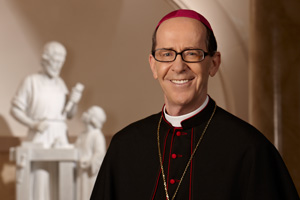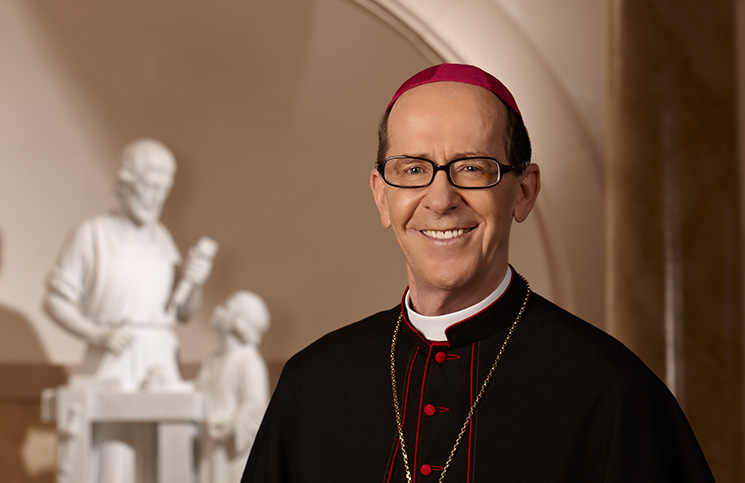“The Lord hears the cry of the poor” (Psalm 34).
Pope Francis also hears their cry and has made service of the poor a top priority in his life and ministry. Repeatedly, since his election as pope, he has called for a Church of the poor, a Church for the poor.

As we continue to look, then, at the teaching of our Holy Father in his apostolic exhortation “The Joy of the Gospel,” let us see why pastoral concern for the poor is so important.
Why love the poor?
It begins with our love of Jesus, noticing how He lived, with whom He spent time, to whom He directed His thoughts and concern. Pope Francis writes (#186), “Our faith in Christ, who became poor, and was always close to the poor and the outcast, is the basis of our concern for the integral development of society’s most neglected members.”
On a daily basis for many years, Pope Francis has meditated on passages of the Bible.
“A mere glance at the Scriptures,” he writes (#187), “is enough to make us see how our gracious Father wants to hear the cry of the poor: ‘I have observed the misery of my people who are in Egypt; I have heard their cry on account of their taskmasters. Indeed, I know their sufferings and I have come down to deliver them… so I will send you…’ (Ex 3:7-8, 10).”
It is the word of God, especially Jesus, God’s Incarnate Word, that has constantly motivated Pope Francis to give priority in his life to the poor. He goes on to write (Ibid), “If we, who are God’s means of hearing the poor, turn deaf ears to this plea, we oppose the Father’s will and His plan; that poor person ‘might cry to the Lord against you, and you would incur guilt’ (Dt 15:9). A lack of solidarity towards his or her needs will directly affect our relationship with God.”
In both the Old Testament and the New Testament, we see this special love of God for the least ones in the world. In the First Letter of John, the Apostles raises a question that remains as relevant today as it was when he first posed it (I Jn 3:17): “How does God’s love abide in anyone who has the world’s goods, and sees a brother or sister in need and yet refuses help?”
Who does not make the news?
Pope Francis asks a rhetorical question to underline the blindness of the modern world to the poor (#53): “How can it be that it is not a news item when an elderly homeless person dies of exposure, but it is news when the stock market loses two points?” Sadly, this spiritual blindness can creep into the hearts of us Christians.[quote_box_right]
Pope Francis’ Game Plan
Read more columns from this series by Bishop Olmsted.
[/quote_box_right]
The failure to take notice of our brother or sister in need is manifested not only by the failure to provide for them the basic necessities of food, clothing, housing and so forth; it is also evident when their spiritual needs are neglected. The Holy Father writes (#200), “I want to say, with regret, that the worst discrimination which the poor suffer is the lack of spiritual care. The great majority of the poor have a special openness to the faith; they need God and we must not fail to offer them His friendships, His blessing, His word, the celebration of the sacraments and a journey of growth and maturity in the faith. Our preferential option for the poor must mainly translate into a privileged and preferential religious care.”
We are blessed to have in the Diocese of Phoenix many organizations like Catholic Charities, the Society of St. Vincent de Paul, Paz de Cristo, St. Joseph the Worker, and a large number of others, who serve the poor with great dedication and generosity. I give thanks too that so many of our families and parishes regularly reach out in service to the poor and vulnerable.
Go first to the poor
When Jesus told His disciples (Mt 28:19), “Go, therefore, and make disciples of all nations,” He clearly had all people in mind, not just the poor, but everyone. Commenting on this great commission, the Holy Father writes (#48), “If the whole Church takes up this missionary impulse, she has to go forth to everyone without exception. But to whom should she go first? When we read the Gospel we find a clear indication: not so much our friends and wealthy neighbors, but above all the poor and the sick, those who are usually despised and overlooked, ‘those who cannot repay you’ (Lk 14:14)… We have to state without mincing words, that there is an inseparable bond between our faith and the poor.”
This has special implication for the Successor of St. Peter and Pope Francis is keenly aware of this (#58), “The Pope loves everyone, rich and poor alike, but he is obliged in the name of Christ to remind all that the rich must help, respect and promote the poor. I exhort you to generous solidarity and to the return of economics and finance to an ethical approach which favors human beings.”
Concern for the poor, however, must not be regarded as a one-way street. Those with economic means have something to give the poor, but they also have much to receive from them. The Holy Father writes of the poor (#198), “They have much to teach us. Not only do they share in the sensus Fidei, but in their difficulties they know the suffering Christ. We need to let ourselves be evangelized by them… We are called to find Christ in them, to lend our voice to their causes, but also to be their friends, to listen to them, to speak for them and to embrace the mysterious wisdom which God wishes to share with us through them.”
Next time, we shall consider what Pope Francis has to say about consumerism, how it offends human dignity, how it leads to a financial system which rules rather than serves.






